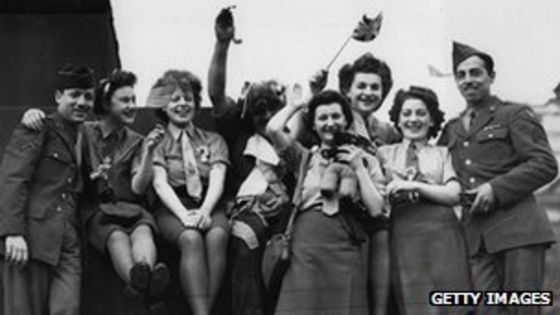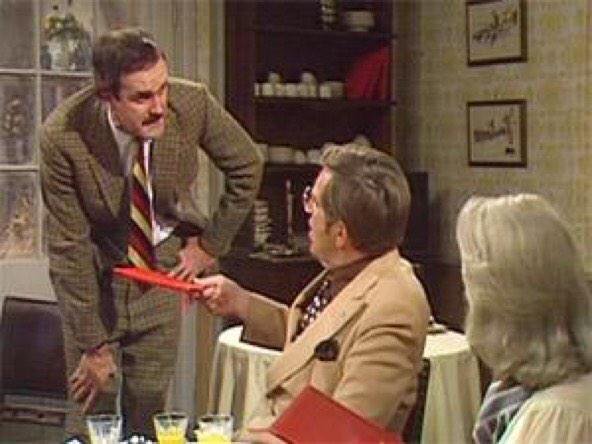September 5, 2016
Part 4: Here Come the Americans
The Americans started coming en masse to Great Britain during the War and have been coming ever since. And what, with their great teeth, flashy ways, and demands for Waldorf salads, they’ve been annoying the Brits ever since.
Between Christmas 2007 and March 2008, Jill and I settled into a routine of household church with Jill working part-time with the Somali refugee women’s group who were about establishing self-sufficient enterprises, as well as relief teaching. I hung out with leaders and helped run the Sunday gatherings and training.
It was then that two blokes came to Sheffield from the US for a visit, two blokes who I still keep in contact with, and one in particular who has shaped my thinking. Once was called Mark and was with the Acts 29 network (no, not that Mark). Incidentally both impossibly squared jawed in a way that only Americans know how.
After four or so months with a group of middle class English evangelicals I probably felt how Londoners felt when the US soldiers arrived during the 40s. Something a bit like this:

There was just something larger than life about them, something robust, less reserved and definitely more sure of themselves.
Though I suspect that, just like in the 40s, the Yankees made some of the UK leaders feel more like this:

The US guys pushed back hard, laughed loud, asked lots of questions and even tried their hand at cricket. But it was no sight-seeing tour, they were taking it all in, wondering if this was the church planting model of the future.
Yet what was that model? Whilst I had come to the UK for radical ecclesiology, “radical” means all the way to the roots. In one critical area this wasn’t the case. For all of the talk of collective decision making, it became clear major decisions about church direction were top down. Others were informed after the event. Strong, older leaders in a room full of milder, younger leaders does not lend itself to true corporate decision making either.
I had gone to the UK intrigued to hear about a group that operated as a household network in which major decisions were group decisions. At the time (not so much now for philosophical and pragmatic reasons) that attracted me.
But so far, from what I could see, apart from the main blokes, many other leaders were either timid or young or both. It all felt more rubber stamped than I would have imagined. Not that this was all bad. Steve and Tim were astonishingly gifted and I would spend a lot of time with both of them, talking, thinking, driving through Sheffield to various meetings, picking their brains.
Often as I drove with Steve to pick up someone from Manchester airport, him driving like Nigel Mansell around the hairpin bends, me hanging on to my seatbelt – and my just-eaten lunch – it felt like time and money well spent. And chilling out with Tim, as he pondered over a book chapter he was writing, that was gold.
At the time they were working on “that” church planting book, and they’d asked me to write the vignettes to accompany the theological frameworks. I get an acknowledgement in the front somewhere (no need to look).
But there was also some serious churn going on. Household groups got swapped around rapidly, some closing down and others starting up instantly. I don’t have a problem with that per se, as too many church programs march on like zombies. The mantra was that the gospel was not about “our comfort”, so if there was any dissent, and I wasn’t hearing much at that point, there was solid theological reason given for putting up with this type of churn. Some seemed change weary, but this was often passed off as a lack of gospel commitment.
There was also a call for uni students who, in the usual UK manner, left their home cities and towns to study elsewhere rather than in their home towns, to commit to Sheffield all year.
During the holidays, when other students went home for good meals and better laundry, they were encouraged to stay and do life together with their church families rather than go home to their physical families.
No one stopped them leaving, but the spoken mantra was “blood is NOT thicker than water.” That’s a high bar to jump. It can create a level of emotional dissonance when you put all of your eggs in the church family basket and those eggs get broken. More of that later.
This “suck it in” approach to church planting differs greatly to that of a good South African friend who is a real pioneer leader. He simply tells eager young blokes “If you’re going to plant, find a suburb or town you really like living in, then plant there, cos it’s hard enough to do without hating where you have to do it.”
There’s a grace element to that that takes into consideration how people might be wired, rather than imposing a one-size-fits-all approach in which, if there’s a problem, you might be it. More of that later too.
But anyway, back to the Yanks. The fact that Acts29 reps were in town was an indicator we were getting some serious airplay over the pond. And we – or should I say “they” – were. By March three blokes called Steve were jetting our way to one of the famed Boot Camps at Mars Hill Church in Seattle, hosted by Mark (yes that Mark!).
Apart from an ear infection which made me vomit all the way to Kurt-Cobain-land (an ear infection is currently the reason I am writing this and not on a plane to Sydney for a conference), it was a great trip. My two US blokes were there, along with dozens of other American church planters. I love Seattle. If I could live in one US city, Seattle would be it, not just because it is home to the heavenly Nirvana, but because there is something sophisticated yet still pioneering about that North West Coast city. Besides, when you’re from flat, sun-bleached Perth, coming to a city where it rains nearly all the time and which has a ruddy great 14 thousand-foot mountain parked just outside, is a novelty.

not Perth
I wasn’t sure about the famous Space Needle though (also pictured above). For all the build up, when we drove up to it, it felt a bit like this (let the reader understand):

Steve had been invited to be the main speaker of the Boot Camp. And it was clear that despite the huge gulf between sexy Mars Hill and homely The Crowded House, he was head and shoulders above anyone else there in terms of theological acumen, biblical insight and cultural grasp. Yes, even Driscoll. He knocked it out of the park (as they would say). The US guys were astonished. Seeing Driscoll was, I imagine, a bit like seeing Britney Spears, he looked more like himself than he should do, so you weren’t sure if he were the real one. But the real talking point was the biblical framework, ecclesiological understanding, and overall big picture of the “guy from Britain”.
On the last and greatest day of the feast we all decamped to Driscoll’s house for dessert and wine. It was a bit like a Prince fan getting in to Paisley Park. I sneaked upstairs and took a photo of me pretending to steal a book from the “most popular” section of his huge library, Rob Bell’s Velvet Elvis as I recall. Just kidding. About the book, not the photo. Must hunt that out some time. The photo, not the book.
It was when I went downstairs and outside again that the reality of why Acts29 had become so popular hit me. There in Driscoll’s front garden on a cool, early spring evening, stood dozens of young men smoking cigars and drinking single malt. And as I listened to their stories I realised that many, most, were refugees from American fundamentalism, either Southern Baptist or Pentecostalism.
These were blokes in their late 20s and 30s just gagging for someone to get up and lead them away from the oppressive cultural squeeze of their fundy parents, who, let’s face it, never lived up to their ideals anyway. But they wanted someone with some theological backbone to follow. The emergent church scene just didn’t do it.
Then along comes Driscoll with a Reformed theological framework repackaged with a flannel shirt and a pair of canvas Cons. What’s not to like? I have come to realise that a whole bunch of blokes arrived at Reformed theology through Driscoll, while a whole bunch of other blokes arrived at Driscoll through Reformed theology.
And where you start makes all the difference to where you finish. One tends to lead to Young, Restless and Reformed for pragmatic reasons; the other to older, settled and Reformed on principled reasons. Which is why, given Mars Hill and Driscoll’s demise, those outside the Reformed camp are surprised that the theological framework hasn’t fallen with it. Those young blokes had never met someone like Steve who’d had the same underlying reformed theological convictions for more than half a decade.
Well whatever it was that night on Driscoll’s lawn, it was as if a dispossessed generation of conservative Christians were, with their smokes and their alcohol, offering a big “up yours” to a middle American evangelicalism that no longer understood what was going on in their own country, socially and culturally.
It was hard to believe, as we flew back a few days later, that Mars Hill, for all its acclaim and strength, wouldn’t last the distance, whilst a local network of household churches in a post-industrial middling English city would.
Written by
There is no guarantee that Jesus will return in our desired timeframe. Yet we have no reason to be anxious, because even if the timeframe is not guaranteed, the outcome is! We don’t have to waste energy being anxious; we can put it to better use.
Stephen McAlpine – futureproof
Stay in the know
Receive content updates, new blog articles and upcoming events all to your inbox.


